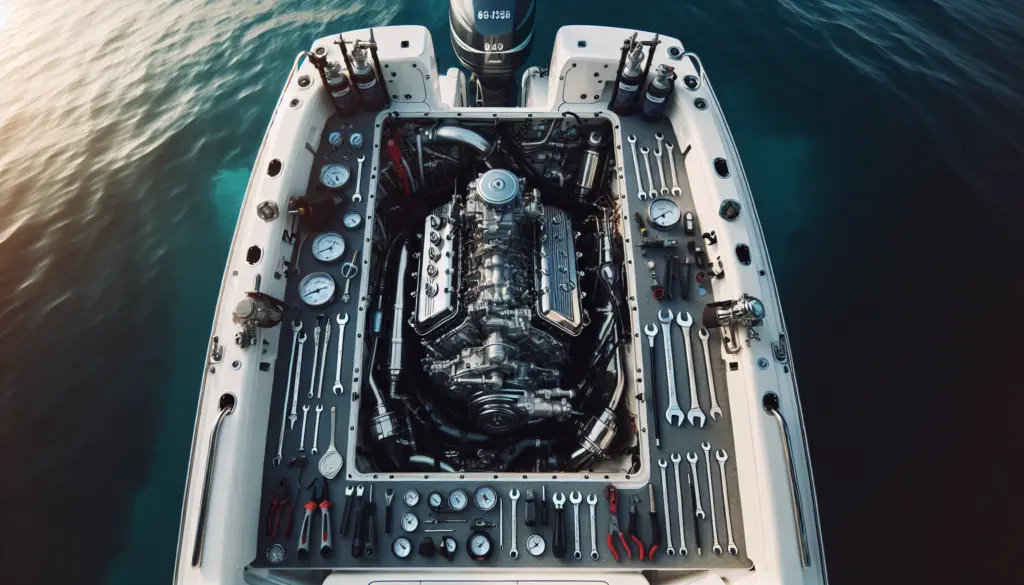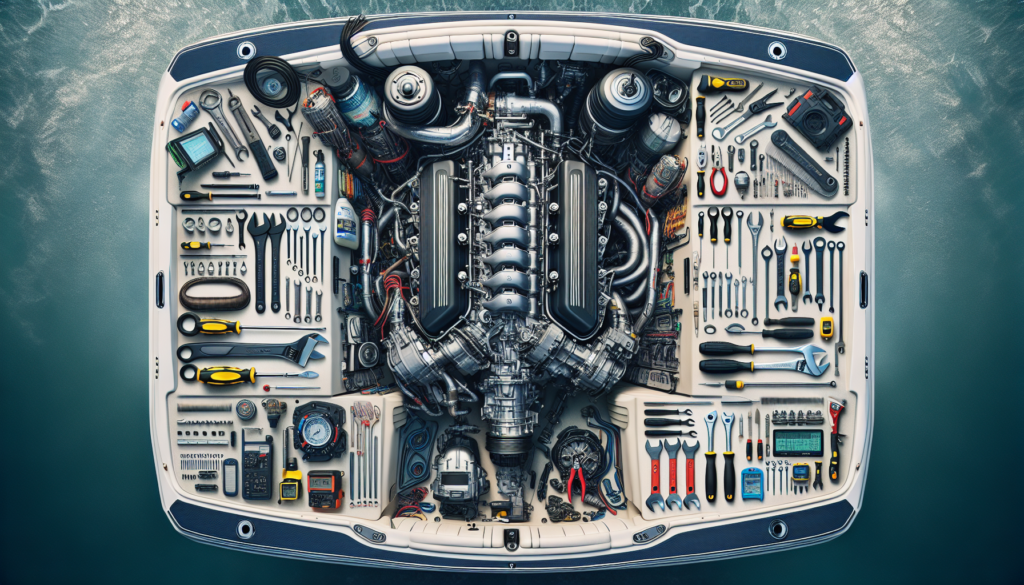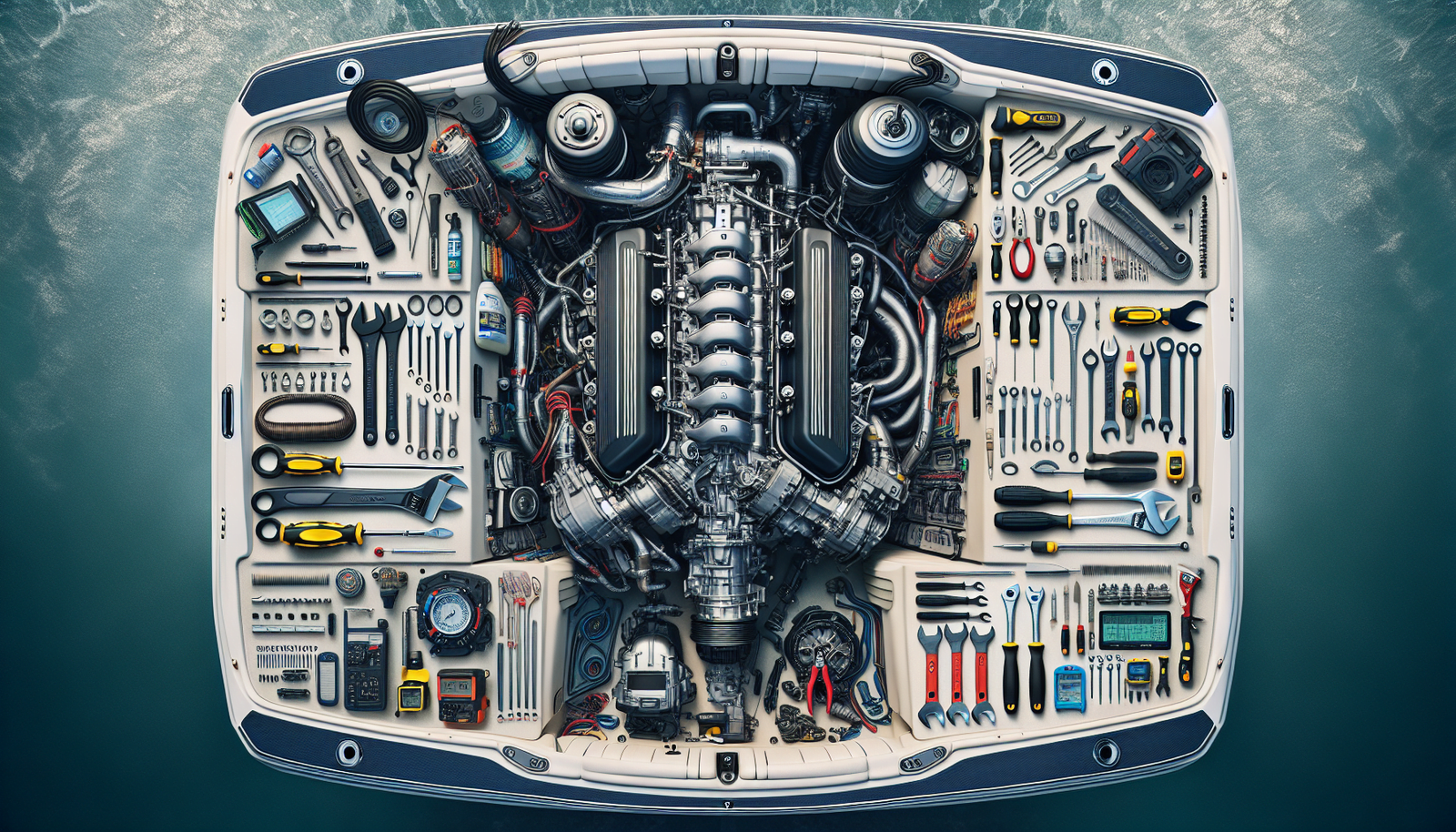You’ve spent countless delightful hours cruising the open water in your beloved watercraft. To continue enjoying this maritime hobby, you need to maintain your boat, specifically the engine. No one wants to be stranded out at sea because of engine failure. So, navigating the routines of boat engine maintenance is crucial to ensure its longevity, just like taking care of a car. The heart of your article will illuminate the nitty-gritty of boat engine servicing, exploring every aspect from the frequency of service, to the signs of a troubled engine, and even preventative measures to make your vessel’s heart beat stronger and longer.

Understanding Boat Engine Maintenance
Boat engine maintenance may seem like an intimidating task if you’re new to it, but it is essential for maintaining the reliability and longevity of your vessel. Having a well-maintained engine means ensuring smoother sailing experiences, less unexpected downtime, and importantly, safer outings on the water.
The importance of regular boat engine servicing
Regular boat engine servicing is crucial to keep your watercraft running optimally. With consistent servicing, potential issues can be identified and rectified early, preventing minor problems from escalating into more serious, more expensive ones. Regular servicing also gives you an insight into the overall health of your boat engine, allowing you to plan accordingly for any necessary replacements.
Dangers of neglecting boat engine servicing
Ignoring servicing usually leads to decreased performance and more frequent breakdowns, which can be costly to fix. Neglected maintenance can result in engine wear and tear and might even lead to total engine failure, posing severe safety risks while you’re out in the water. Regular monitoring and servicing are essential in preventing these hazards and ensuring your boat engine’s reliable performance.
Basic components of a boat engine
A boat engine can be complex, but you don’t have to be a mechanic to understand its basic components. At its core, it includes parts such as the fuel system, intake valves, exhaust valves, spark plugs, piston, crankshaft, and cooling system. Familiarity with these parts will help you understand the function of your boat engine better and make informed decisions in its maintenance.
Frequency of Boat Engine Service
Factors affecting service frequency
Several factors determine how often your boat engine needs servicing. These factors include the type of engine, the age of the boat, how frequently it’s used, where it’s used, and how well it’s cared for between uses.
Manufacturer’s recommendations
Manufacturers provide specific recommendations for maintenance intervals, including both hours of operation and calendar periods. It’s essential to follow these guidelines to assure optimal performance and prolonged engine life.
Understanding service intervals
Service intervals represent the time frames or mileage at which certain parts of your engine need to be checked or replaced. Common intervals for various components such as the engine oil, spark plugs, or fuel filters vary based on several factors including the type of engine and its usage.
Types of Boat Engine Service
Minor service – routine maintenance
This involves basic checks and minor replacements such as engine oil change, coolant check, and filter change, typically done at every service interval. This preventive maintenance helps in identifying potential problems early and keeps your boat running smoothly.
Major service – in-depth inspections and repairs
Major servicing involves more in-depth inspections and potentially significant repairs, typically carried out on a less frequent basis than minor service. This might include overhauling certain components or making significant replacements.
Emergency service – handling unexpected breakdowns
Despite the best maintenance practices, unexpected breakdowns can occur. Emergency services include troubleshooting and repair procedures that address sudden failure of critical engine components or systems.

Things to Consider During Regular Servicing
Engine oil and filter change
Regular oil and filter changes are crucial in maintaining your boat engine’s overall health. Old oil loses its effectiveness and can cause the engine to work harder, contributing to premature wear.
Fuel system check
A fuel system check involves inspecting the fuel lines, tanks, and filters for signs of wear, damage, or leakage. This is key in preventing potential engine problems related to contamination or fuel delivery issues.
Exhaust system inspection
The exhaust system’s role in extracting and disposing of the engine’s waste gases is critical. Regular checks for signs of corrosion, blockages, or leaks are necessary for maintaining this system.
Checking the cooling system
The cooling system helps prevent the engine from overheating, which could lead to severe damage. Regular checks of the coolant level, thermostats, and impellers are crucial for maintaining this system efficiently.
Recognizing Signs That Your Boat Engine Needs Servicing
Decreased engine performance
If your boat’s acceleration feels sluggish, the fuel economy decreases, or you notice any significant changes in the boat’s performance, these might be signs that your engine needs servicing.
Unusual engine noises
Strange noises such as knocks, vibrations, or excessive noise can signal issues with the engine components.
Excessive smoke or fumes
Unusual amounts of smoke or fumes, especially of colors other than the typical faint blue of healthy engine exhaust, can indicate problems in the combustion process or issues with engine oil.
Visible damage or abnormalities in engine components
Physical damage, corrosion, oil leaks, worn belts, or any visible abnormalities in engine components should be addressed immediately.
Understanding the Costs of Boat Engine Service
Cost estimates for regular maintenance
The cost of regular maintenance can vary significantly based on factors such as the type and age of your boat, the specific services required, and your geographical location.
Factors affecting the cost of boat engine servicing
The cost of boat engine servicing can be affected by several factors, including the complexity of the service, the cost of replacement parts, labor rates, and whether inboard or outboard services are needed.
Ways to reduce servicing costs
Regular preventive maintenance, following recommended service intervals, and a proactive approach to identifying issues can help reduce the overall costs of servicing.
The economic implications of ignoring service
Neglecting boat engine service can lead to significant costs in the long run, from more expensive repairs or replacements to decreased resale value.
DIY Boat Engine Service Tips
Basic maintenance tasks you can do yourself
Tasks like changing the oil and filters, inspecting belts, checking coolant levels, and others can often be carried out by the boat owner with a bit of knowledge and the right tools.
When to call a professional
However, for more complex tasks like diagnosing engine issues, replacing major components, or any tasks outside your comfort zone, it’s safer and often more cost-effective to enlist a professional.
Safety precautions during DIY servicing
If you choose to do your engine maintenance, always use the right tools, ensure the engine is cool before starting your work, and follow recommended safety practices.
Tools needed for DIY boat engine servicing
Your toolbox should contain basic tools like screwdrivers, wrenches, pliers, a socket set, as well as specific tools like spark plug wrenches and oil filter wrenches, depending on what tasks you plan to tackle.
Evaluating Service Professionals
Finding reliable boat engine service professionals
Research through online reviews, local boating communities, or personal recommendations can help you find reliable service.
Questions to ask potential service providers
Don’t be afraid to ask about their experience, certifications, warranties provided, or any other questions you may have.
Comparing costs and service offerings
Ensure you’re getting good value by comparing costs and services of several providers. However, remember, quality should not be compromised for cheaper costs.
Maintaining Your Boat Engine in Off-Season
Understanding the concept of winterizing
Winterizing is the process of preparing your boat engine for long periods of inactivity during colder months. It prevents severe damage to your engine caused by freezing temps.
Off-season boat engine maintenance tasks
This typically includes tasks like engine oil change, fogging the engine, draining and filling the lower unit with fresh fluid, among others.
Storing your boat properly to prevent engine damage
Proper storage of your boat during the off-season is essential. It reduces the risk of damage from uncontrollable environmental factors such as temperature variations, water, or pests.
Long-Term Boat Engine Maintenance
Planning for long-term boat engine health
Proper long-term maintenance involves planning for preventive maintenance, consistent servicing, addressing minor repairs promptly, and maintaining records for the service history.
Guide to extending boat engine lifespan
Regularly replacing spark plugs, changing oil and filters, maintaining the fuel system, and keeping the engine cool can have a huge impact on extending the lifespan of your boat engine.
The impact of regular service on resale value of the boat
Regular, documented servicing not only maintains but also potentially increases the value of your boat. A well-kept boat engine conveys that you have taken care of the boat, leading to higher resale value.

